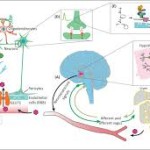 Insulin is a protein hormone, secreted by the beta cells in the pancreas. The body uses insulin in the regulation of carbohydrates metabolism and to transport blood sugar, or blood glucose, across the cell membrane for the cells to use as energy. Insulin will also stop the body from using fat as an energy source by stopping the release of glucagon.
Insulin is a protein hormone, secreted by the beta cells in the pancreas. The body uses insulin in the regulation of carbohydrates metabolism and to transport blood sugar, or blood glucose, across the cell membrane for the cells to use as energy. Insulin will also stop the body from using fat as an energy source by stopping the release of glucagon.
It is important to note that your brain does not need insulin to get glucose into the brain cells because it uses a different transport system that doesn’t depend on insulin.
When the cells become resistant to the effects of insulin or when the body reduces the amount of insulin produced, the result is diabetes. The body produces insulin in response to the amount of glucose or sugar in the bloodstream. The higher the amount of blood glucose the more insulin is produced.
Your body turns a number of different types of foods into sugar in the body. So you don’t have to eat a candy bar to raise your sugar levels. Almost all types of carbohydrates will accomplish the increase in blood sugar. This effect will generally occur in the small intestines where it immediately enters the blood stream.
Insulin will also cause the liver to store blood sugar as glycogen. Effectively, when your body has too much sugar for current use, the liver will store it as glycogen to use later when you may not have as much sugar in your bloodstream for use by the cells for energy.
As the glycogen is stored and reaches maximum capacity, more storage is stopped by the liver. Then the excess sugar is used in the synthesis of fatty acids and exported as lipoproteins. The body then uses the free fatty acids to synthesize triglycerides.
In other words, insulin will drive most cells to prefer the oxidation of carbohydrates for energy instead of fatty acids and then stimulate the accumulation of fat in the body. Individuals who have the goal of losing weight will find that although they may stay within their calorie limits, if those limits have a significant number of carbohydrates, their body will be increasing the amount of fat stored over time.
As the amount of glucose in your bloodstream falls, then the amount of insulin being secreted also falls. When there is no insulin being secreted the majority of the cells will turn to fatty acids for energy.
Resources:
Clinical Biochemistry Review: Insulin and Insulin Resistance
http://www.ncbi.nlm.nih.gov/pmc/articles/PMC1204764/
Journal of Clinical Investigation: Physiologic Evaluation of factors controlling glucose tolerance in man
http://www.ncbi.nlm.nih.gov/pmc/articles/PMC370948/
Hormone and Metabolic Research: Hierarchy of physiological responses to hypoglycemia
http://www.ncbi.nlm.nih.gov/pubmed/9137976
Diabetes, Obesity and Metabolism: Physiological responses during hypoglycemia induced by regular human insuline or a novel human analogue, insulin glargine
http://www.ncbi.nlm.nih.gov/pubmed/11225967
American Diabetes Association: Physiological Consequences of phasic insulin release in the normal animal
http://diabetes.diabetesjournals.org/content/51/suppl_1/S103.long
American Diabetes Association: Physiology and pathophysiology of insulin secretion
http://care.diabetesjournals.org/content/13/6/655.full.pdf
Colorado State: Physiologic Effects of Insulin
http://arbl.cvmbs.colostate.edu/hbooks/pathphys/endocrine/pancreas/insulin_phys.html


Leave a Reply